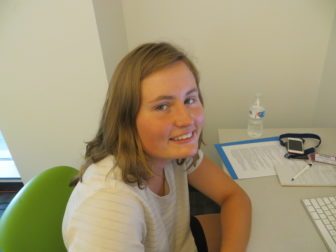By the 1990s, a number of Connecticut cities and towns imposed youth nighttime curfews in an effort to address juvenile crime.

Kelly Chmielewski
Today, most of those curfews are no longer in place, and many youth advocates have shifted their emphasis to after-school programs, which they say are more effective.
Unlike adult offenses, most juvenile crimes occur during the hours of 3 p.m. and 7 p.m., according to the FBI National Incident-Based Reporting System.
“The overwhelming reason for this is a lack of adult supervision,” said Ken Anthony, director of professional development and research for the Connecticut After School Network in Branford. “Approximately 14.5 million children go home alone after school each day. The lack of structure, boredom and negative peer influence play into the crime statistic. Children and youth are more likely to be a victim of or perpetrate a crime because of these factors. After 6 p.m., children are more likely with an adult, therefore, less likely to be involved in criminal activity.”
Although curfews may be perceived as beneficial by parents, there is little evidence to back that up. Ten studies, varying in rigor, have been unable to show any correlation between drops in juvenile crime rates and curfews. In fact, crime rates are as likely to increase as they are to decrease, studies show.
However, after-school programs have the greatest ability to decrease juvenile crime rates, according to numerous studies. The Boys and Girls Club of New York City implemented after-school programs in a number of housing developments, and soon after, saw a 13 percent decrease in juvenile arrests, a 22 percent decline in drug activity and a 12.5 percent decline in vandalism, according to an issue brief by the Afterschool Alliances.
There are no citywide curfews in effect for minors, but there are after-school programs available.
“Children who attend after-school programs are provided a safe space that helps them grow as individuals,’’ Anthony said. “With the increased demands during the school day, afterschool provides the opportunity for children to be exposed to a myriad of interest area, often with a multi-disciplinary focus.”
Anthony said the programs reduce the likelihood of crime because “they provide a space for children to be engaged, interact with positive role models, and help them find interests and passions that will help them connect with learning during the school day. Likewise, children who attend after-school programs have shown an increase in school attendance, positive social interactions and academic gains in math.”
Although created with good intentions, curfews have the potential to be abused and simply do not give juveniles the same nurturing growth that after-school programs do, youth advocates say.
“As opposed to after-school programming, which is optional, enriching and helps build positive peer supports, curfews are mandatory and imposed on children and youth. This perpetuates anger and resentment instead of offering a vehicle for positive influence and change in a child’s life,” Anthony said. “Children are more likely to rebel against the imposition of a curfew and sneak out or willingly go against the dictate.”
Some advocates said that curfews infringe on civil liberties and give police reasons to stop minors. They say that power can be abused.
“Juvenile curfew laws encourage tension and distrust of the police and local government. The reason this happens is because curfew laws assume all youth are potential criminals,’’ said Melvin Medina, the advocacy and outreach director of the American Civil Liberties Union of Connecticut. “When curfew laws are passed, police are allowed to stop and question anyone that is outside. In fact, under juvenile curfew laws, police are supposed to assume that because someone is breaking the curfew law, that person also intends to commit a crime.”
A number of cities, including Bridgeport, Hartford, New London and New Britain instituted curfews in the early 1990s to the early 2000s. Several, including Vernon, faced court fights over their enforcement of the curfews.
Opponents of Vernon’s curfew argued that the ordinance “violated children’s rights to assemble and engage in Constitutional activities,’’ a 2006 Connecticut Office of Legislative Research report said.
Medina said that curfews are “ineffective at reducing crime because they criminalize normal and otherwise lawful behavior, like standing on street corners, walking you dog and playing sports with friends outside. Also, because the laws are so broad in their scope, they require police to spend time that they could be using to focus on solving and preventing real crimes.”
He said there are better ways to prevent juvenile crime, and after-school programs are one of them.
“After-school programs work when they keep young people busy and give them the opportunity to explore their talents and new skills,’’ he said. “They also encourage young people to socialize with their peers and learn how to work in teams.”
Kelly Chmielewski is a student at East Catholic High School, Manchester.